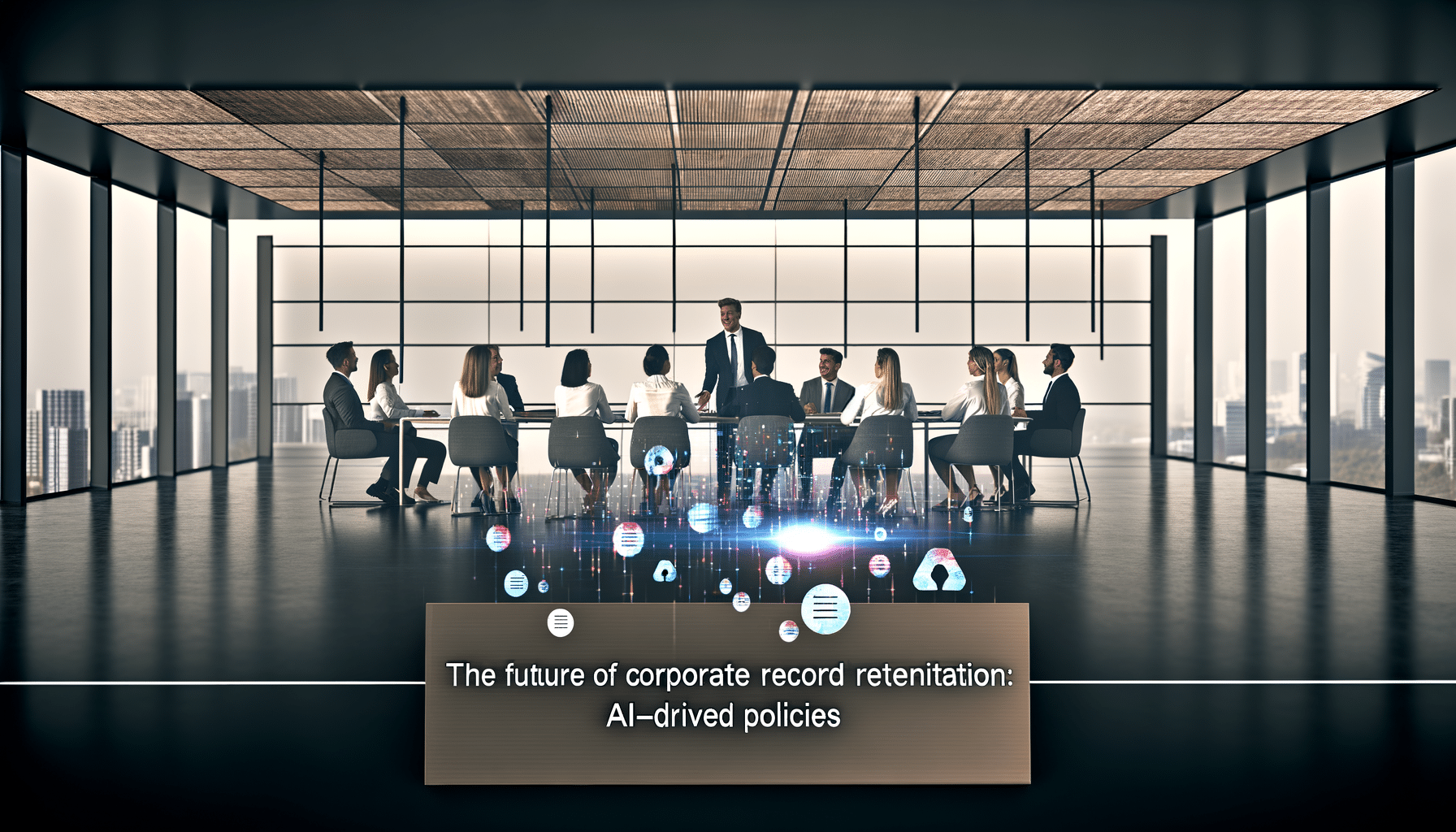- Corporate Governance
- November 16, 2024
The Future of Corporate Record Retention: AI-Driven Policies

Introduction
In our rapidly evolving digital landscape, one cannot ignore the transformative impact Artificial Intelligence (AI) has on streamlining business processes. As someone deeply entrenched in entrepreneurship and tech innovation, addressing corporate record retention is particularly close to my heart. At RecordsKeeper.AI, we’ve harnessed AI’s full potential to revolutionize how record retention policies are conceived and implemented, making it far more strategic and less cumbersome.
Why Traditional Retention Policies are Outdated
Traditional corporate retention policies have long been a source of frustration due to their manual inputs and rigid structures. These policies fail to adapt to evolving business environments, often resulting in poor compliance and legal challenges. Manual data handling not only leads to inefficiencies but also increases the risk of human errors, jeopardizing data integrity and security.
AI Automation: A Game Changer
AI automation is reshaping this landscape by introducing dynamic, self-updating retention policies. By leveraging machine learning, AI efficiently categorizes and tags records, adapting retention policies that reflect current legal and compliance frameworks. This ensures that your company’s data handling practices stay up-to-date effortlessly.
With AI driving retention decisions, response times for audits and compliance checks have significantly reduced. At RecordsKeeper.AI, I’ve seen firsthand how AI evolves existing procedures into smarter, more efficient data management processes.
Real-World Impact
Through natural language processing, AI algorithms understand and execute retention rules based on nuanced categories like document type and industry regulations, ensuring greater compliance with policies such as GDPR and HIPAA. I’ve seen AI automation play a crucial role in facilitating secure data cleansing by identifying data that is eligible for deletion or retention extension.
Enhancing Security with AI
Security is undeniably one of the top concerns for any enterprise dealing with sensitive records. AI offers unprecedented security mechanisms by pinpointing vulnerable areas and reinforcing them automatically. This secure framework extends beyond AI classification; blockchain integration at RecordsKeeper.AI guarantees data immutability with tamper-proof record keeping. The synergy of AI and blockchain reshapes how corporate entities secure their digital assets.
Secure Data Rooms
Controlled access to sensitive records is another layer where AI proves vital. Secure data rooms empowered with AI-driven controls allow businesses to share information without the fear of unauthorized access. My journey with RecordsKeeper.AI has taught me that, ultimately, a well-secured platform is essential for robust corporate governance.
Cost Savings & Efficiency
AI technology significantly reduces operational costs by automating manual processes, leading to labor and time savings. Businesses can allocate resources to strategic activities, enhancing overall efficiency and productivity. From my own experience, AI-driven platforms free up organizational bandwidth, allowing teams to focus on innovation rather than mundane manual audits and checks.
Implementing AI-Driven Policies
In implementing AI-driven policies, begin by defining your organization’s retention requirements and identifying AI tools to automate and simplify those processes. The transition might require an upskilling initiative for your teams, equipping them with knowledge to operate AI systems efficiently.
Looking Ahead
As AI continues maturing, the onus is on us to foster an organizational culture that embraces technology’s disruptive role in redefining corporate governance standards. The potential of AI is exponential, and organizations that fail to adapt risk being left behind.
A Call to Action
This conversation on AI-driven policies serves not only to inform but also to incite action. Reach out, explore how innovation can redefine your processes, and give AI the room to drive efficiency in your corporate structure.
Conclusion
In summary, adapting AI for record retention policies transforms a traditionally tedious task into a strategic business advantage. The shift towards AI automation enhances security, ensures regulatory compliance, and promotes cost efficiency. I encourage you to delve deeper, stay informed about how AI can redefine corporate governance, and, most importantly, seize the opportunity to innovate—just as we continuously strive to do at RecordsKeeper.AI.
By staying ahead of the curve, we can ensure that we are not just participants in the future of corporate record retention— we are the pioneers shaping it.
Toshendra Sharma is the visionary founder and CEO of RecordsKeeper.AI, spearheading the fusion of AI and blockchain to redefine enterprise record management. With a groundbreaking approach to solving complex business challenges, Toshendra combines deep expertise in blockchain and artificial intelligence with an acute understanding of enterprise compliance and security needs.
Related Posts

Organizing Committee Meeting Records
Managing committee meeting documentation effectively.
- November 17, 2024

Handling Corporate Meeting Minutes
Best practices for managing meeting documentation.
- November 17, 2024
Archives
- December 2024
- November 2024
- October 2024
- September 2024
- August 2024
- July 2024
- June 2024
- May 2024
- April 2024
- March 2024
- February 2024
- January 2024
- December 2023
- November 2023
- October 2023
- September 2023
- August 2023
- July 2023
- June 2023
- May 2023
- April 2023
- March 2023
- February 2023
- January 2023
- December 2022
- November 2022
- October 2022
- September 2022
- March 2019
Want to get more content like this?
Signup to directly get this type of content to your inbox!!
Latest Post
Organizing External Auditor Access
- December 22, 2024
Document Control in Manufacturing Plants
- December 21, 2024
Handling Rush Financial Report Requests
- December 20, 2024
Managing Record Access After Staff Changes
- December 19, 2024





